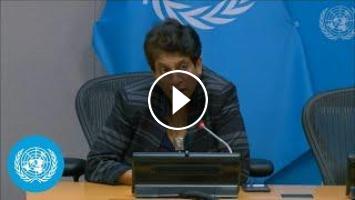Kanni Wignaraja, Director of the Regional Bureau for Asia and the Pacific of the UN Development Program (UNDP) said that in Afghanistan “there have been a lot of restrictions on women's work. At the same time, curiously, there have been some easing of restrictions on women working in certain fields.”
“So, you see in trade and commerce, you can work without a restriction or a ban so to speak, and similarly in the health sector, whereas in formal public service, formal employment of women dropped even further, it was that dropped to 11 percent and now it's half of that at 6 percent,” added Wignaraja today (7 Mar) briefing the press in New York.
She continued, “The biggest, biggest challenge here is the continued edict that bans girls' education. So, not being able to move forward after grade six is a big, big stumbling block. And the curious thing is that now there is encouragement for women to go into nursing and midwifery and in fact, when I was there the discussion of some medical fields. However, last year, no girls graduated from grade 12.”
On climate, she said, “The harsh impact of continuous natural disasters, I would say the big red flag is the scarcity of water. And that is very worrying. the water table has really dropped dramatically across many parts of Afghanistan which previously had sufficient underground water.”
Addressing the press virtually, also Stephen Rodriques, UNDP Resident Representative in Afghanistan, provided an update on the socioeconomic situation in the country.
He said, “Since 2021, since the takeover, the Afghan economy contracted by 27 percent. Now, by way of comparison, when the US had its great depression, in the 1930s, the US economy had contracted by about 29 percent over a period of four years initially. So, we're looking at contraction at the same level as a Great Depression.”
He also said, “69 percent of the population are living at a subsistence level. They're barely able to afford basic needs: utilities, food, shelter, etc.”
He stressed, “The humanitarian assistance over the last two years has been quite important to prevent people from starving. But now the Afghan economy simply has to grow. And we have to find ways to enable people to have a decent livelihood so they can have a life of dignity.”
“So, you see in trade and commerce, you can work without a restriction or a ban so to speak, and similarly in the health sector, whereas in formal public service, formal employment of women dropped even further, it was that dropped to 11 percent and now it's half of that at 6 percent,” added Wignaraja today (7 Mar) briefing the press in New York.
She continued, “The biggest, biggest challenge here is the continued edict that bans girls' education. So, not being able to move forward after grade six is a big, big stumbling block. And the curious thing is that now there is encouragement for women to go into nursing and midwifery and in fact, when I was there the discussion of some medical fields. However, last year, no girls graduated from grade 12.”
On climate, she said, “The harsh impact of continuous natural disasters, I would say the big red flag is the scarcity of water. And that is very worrying. the water table has really dropped dramatically across many parts of Afghanistan which previously had sufficient underground water.”
Addressing the press virtually, also Stephen Rodriques, UNDP Resident Representative in Afghanistan, provided an update on the socioeconomic situation in the country.
He said, “Since 2021, since the takeover, the Afghan economy contracted by 27 percent. Now, by way of comparison, when the US had its great depression, in the 1930s, the US economy had contracted by about 29 percent over a period of four years initially. So, we're looking at contraction at the same level as a Great Depression.”
He also said, “69 percent of the population are living at a subsistence level. They're barely able to afford basic needs: utilities, food, shelter, etc.”
He stressed, “The humanitarian assistance over the last two years has been quite important to prevent people from starving. But now the Afghan economy simply has to grow. And we have to find ways to enable people to have a decent livelihood so they can have a life of dignity.”
- Category
- United Nations
- Tags
- UN, United Nations, UNGA
Be the first to comment













